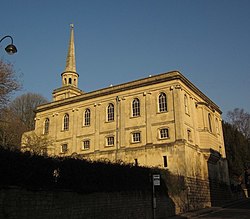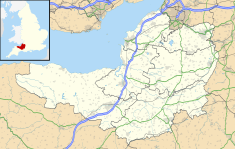Church of St Swithin, Bath
| Church of St Swithin | |
|---|---|
 | |
| Location | Bath, England |
| Coordinates | 51°23′19″N 2°21′34″W / 51.38861°N 2.35944°W |
| Built | 1779–90 |
Listed Building – Grade II* | |
| Designated | 12 June 1950[1] |
| Reference no. | 1394245 |
The Anglican Church of St Swithin on The Paragon in the Walcot area of Bath, England, was built between 1777 and 1790. It is a Grade II* listed building.[1]
The church stands on the site of a previous place of worship dating back to the 10th century, the remains of which are beneath the crypt.[2] The dedication is to Swithun, an Anglo-Saxon Bishop of Winchester and subsequently patron saint of Winchester Cathedral.[3] Jane Austen's parents were married at St Swithin's on 26 April 1764 and her father George Austen is buried there.[4]
The current building was erected by John Palmer between 1777 and 1790.[5] His new church opened in 1777 but was soon too small for its growing congregation, as the city became increasingly popular and expanded well beyond its traditional boundaries.
On 30 May 1797 the abolitionist William Wilberforce and Barbara Spooner Wilberforce were married in the church.[6] In 1805 it was the burial place of the writer and poet Christopher Anstey[7] and, in 1831, of Rear Admiral Sir Edward Berry. In 1840 it was the burial place of the writer Frances Burney; her husband, General Alexandre D'Arblay was buried there in 1818.[8] The church house, number 38, The Paragon, was built in the early 18th century.[9] A depiction of the Ascension of Jesus in stained glass was added to the east wall in the 1840s.[2] The adjoining cemetery has gates with a rusticated base and panels with inverted torches between pilasters. There is an entablature with metopes and triglyphs.[10]
See also
References
- ^ a b Historic England. "Church of St Swithin (1394245)". National Heritage List for England. Retrieved 26 April 2016.
- ^ a b "Our History". St Swithin's Church. Archived from the original on 14 February 2016. Retrieved 30 October 2015.
- ^ "Walcot, History of St. Swithin's". Bath Daily Photo. Retrieved 30 October 2015.
- ^ "Jane Austen in Bath: St Swithin's Church, Walcot". Austenonly. Retrieved 30 October 2015.
- ^ "Church of St Swithin, Walcot". Images of England. English Heritage. Archived from the original on 22 October 2012. Retrieved 30 October 2015.
- ^ Wolffe, John; Harrison, B. (May 2006) [online edition; first published September 2004], "Wilberforce, William (1759–1833)", Oxford Dictionary of National Biography, Oxford University Press, doi:10.1093/ref:odnb/29386, ISBN 978-0-19-861411-1
- ^ "Christopher Anstey". Westminster Abbey. Retrieved 24 April 2015.
- ^ https://www.findagrave.com/cemetery/2141667/st.-swithin-churchyard
- ^ "Walcot Church House". Images of England. English Heritage. Archived from the original on 24 October 2012. Retrieved 30 October 2015.
- ^ "Walcot Cemetery Gates". Images of England. English Heritage. Archived from the original on 24 October 2012. Retrieved 30 October 2015.

